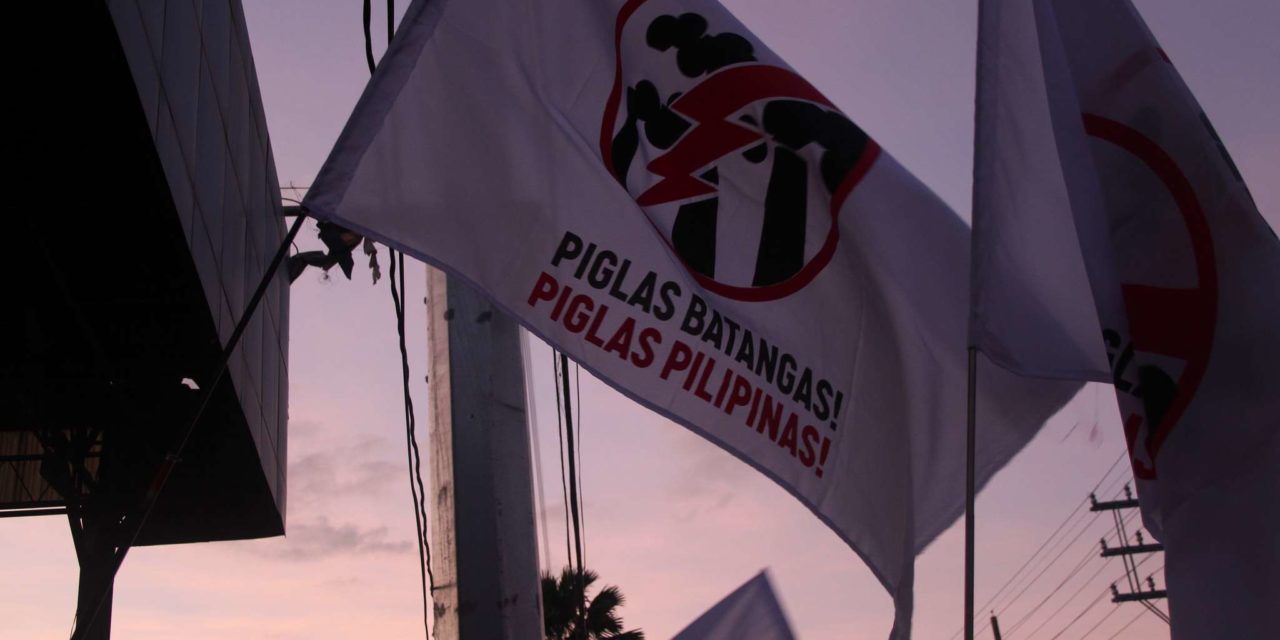As June comes to a close, the Philippine Environment Month, Galileo de Guzman Castillo reflects on the recent event in Batangas, Philippines, underscoring the struggles of Filipinos, especially from this province, against fossil fuel and government’s continuing support to the construction of coal-fired power plants.
“Tayo ay nakikibahagi sa mundo at nakikiisa sa bawat isa,
Upang alalahanin ang ating kinabukasan at ng mga susunod na salinlahi;
Itaguyod ang katarungan at kapayapaan!”
(We are coming together and uniting as one,
To remember our future and the future of the next generations;
Uphold and support justice and peace!”)
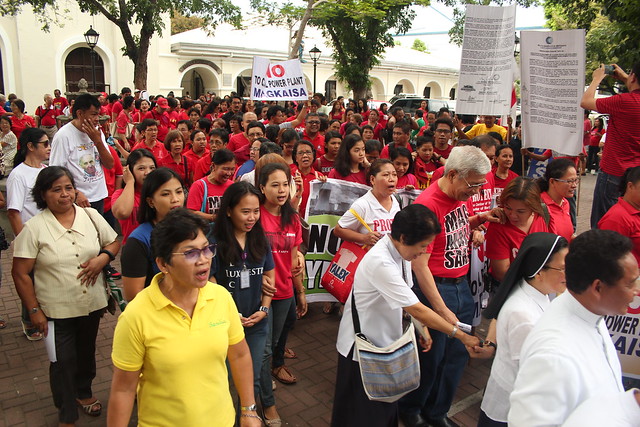
On the weekend before June 20, the day when the Batangas City Council would vote on the application of JG Summit Holdings for a 600-megawatt (MW) coal-fired power plant, the Break Free Philippines, Break Free Batangas Campaign[i] released an action alert urging members of the campaign and the public to help in convincing the council to vote against the locational clearance application for the plant’s construction in the village of Pinamucan Ibaba.
The permit is one of the preliminary requirements of the local government before a company can commence its operations in its jurisdiction.
On June 20, the Basilica of the Immaculate Conception in Batangas City, 120 kilometers south of Manila, became a sea of red as hundreds of anti-coal campaigners, wearing red shirts, from different regions of the country converged to stand in solidarity with the people of Batangas City in their struggle against coal.
Chants of “No to Coal Yes to God!” filled the air as people, led by the Archdiocesan Ministry for Environment (AMEn), held a prayer rally to urge the City Council and Batangueños to reject the application for the building of another coal-fired power plant in their province.
According to Batangas City Councilor Kristine Balmes, “Batangas currently has four existing coal-fired power plants, with a total installed capacity of 900 MW and there are already three more coal projects in the pipeline.”
This is equivalent to 2,268 kilograms of carbon dioxide (CO2) emissions generated per hour or more than 1.6 million kilograms of CO2 emitted every month.
The prayer rally also aimed to commemorate the anniversary of “Laudato si’: On Care for Our Common Home,”[ii] Pope Francis' encyclical on the environment.
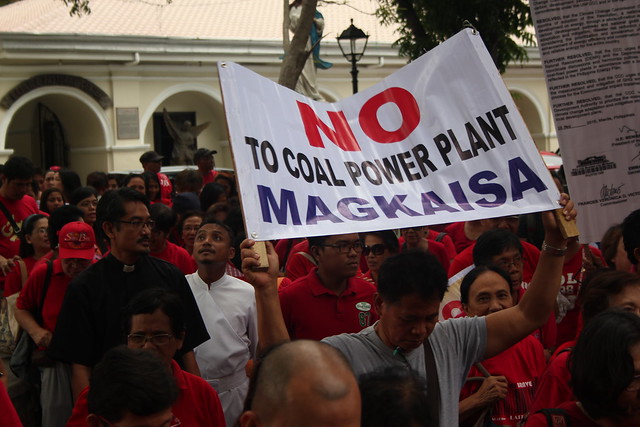
People began marching from the Basilica toward the City Government Hall, passing by the Gusali ng Kalikasan at Kapayapaan (Green Building, or literally the Building of Nature and Peace) along the way. One proudly raised his placard, “No to coal power plant! Magkaisa! (People, unite!)” Another held high a large-format, printed version of the Philippine Climate Change Commission (PCCC) Resolution No. 2016-001[iii] for everyone to read.
The resolution calls for a national energy policy review to harmonize regulations on new and existing coal plants, affirming the commitment of PCCC to mainstream a low-carbon development pathway for the Philippines. These are all in line with the country’s commitments under the United Nations Framework Convention on Climate Change (UNFCCC) along with its Intended Nationally Determined Contributions or INDC, submitted just last year.
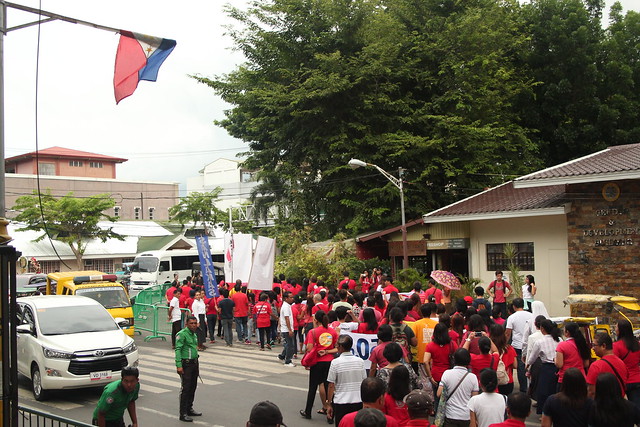
The Philippines committed to the international community an ambitious 70 percent greenhouse gas (GHG) CO2e emissions reduction by 2030, conditional on the support from international climate financing, on technology transfer, and capacity development.
An ambitious commitment, yes, but also a commitment mired with contradictions.
At the same time that the Philippines commits itself to a 70 percent emission reduction, it is bent on sustaining its high economic growth and does not seem to balk from fuelling this growth by producing energy from coal. Both the local and national governments have approved coal project applications and permits left and right, with no regard for the impacts of coal on human ecological systems.
An energy planning process from the ground up, one that involves the people and the communities is also non-existent in a country with top coal conglomerates hungry for profits and investments.
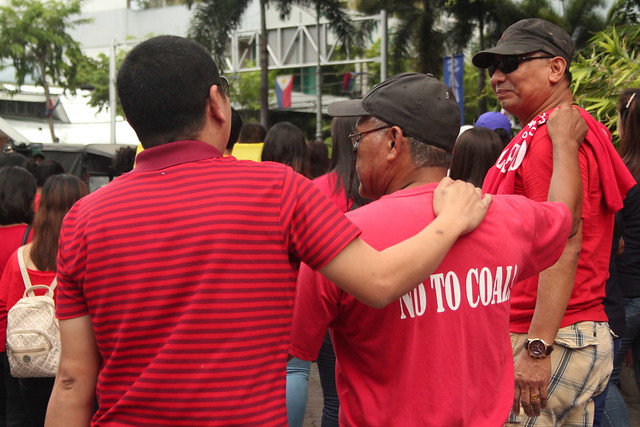
“Kung ang sinasabi nilang ‘progreso’ ay patuloy na pagyaman ng iilan at patuloy na paghihirap naming mga mahihirap, paano namin tatanggapin ito?” (If the economic growth and progress they are saying involves the rich getting richer and the poor getting poorer, how can we accept this kind of development?), lamented one protester.
Filipino business magnate and investor John Gokongwei, Jr., Founder and Chairman Emeritus of the JG Summit Holdings Corp. is the second richest entrepreneur in the Philippines, with a net worth of about $6 billion[iv], ranking only behind fellow billionaire Henry Sy ($15 billion-worth).
Gokongwei also owns the first and only Naphtha Cracker Plant in the Philippines, operated by the JG Summit Petrochemicals Group.
The petrochemical facility, which requires tremendous amounts of energy to operate, is located in the company’s industrial complex in Barangay Simlong, also in Batangas City.
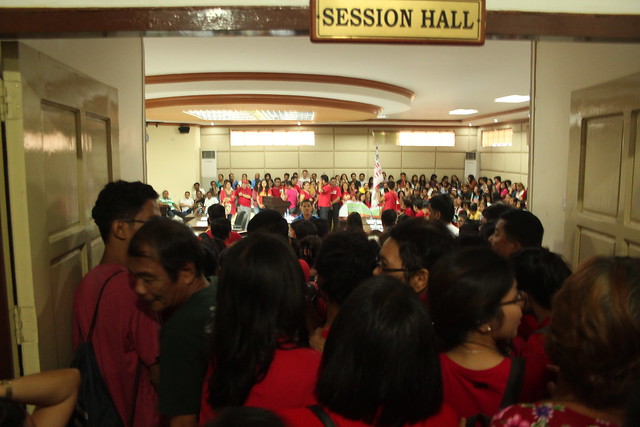
Upon reaching the Batangas City Hall, the people quickly began occupying the session hall, a room usually bereft of audience.
The session hall was unmistakably divided—anti-coal campaigners in red on one side and pro-coal campaigners on the other.
One held a placard that read, “Ibigay sa amin kulay bughaw na alapaap, ayaw namin ng plantang usok sa maitim na ulap!” (Give us blue skies; we do not want smoke from coal-fired power plants and black clouds!)
While waiting for the city councilors and the presiding officer, the people collectively sang Bayan Ko (My Country), a popular patriotic song. The session hall was not only filled with a sea of anti-coal campaigners, but also with music and lyrics of protest.
Ibon mang may layang lumipad, (Even Birds that freely roam the Sky,)
Kulungin mo at umiiyak, (Weep when caged,)
Bayan pa kayáng sakdál dilág, (What more if it were a nation so fair,)
Ang 'dì magnasang makaalpás? (Yearn to break the chains?)
Pilipinas kong minumutyâ, (Philippines, I adore,)
Pugad ng luhà ko't dalita; (Cradle of tears and misery;)
Aking adhika, (All that I desire,)
Makita kang sakdál laya! (To see you absolutely free!)
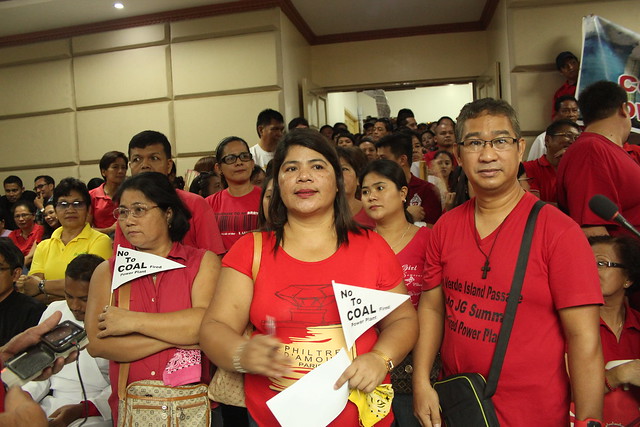
A few minutes after 10:00 a.m., the councilors finally arrived and the session started.
The “Committee Report of the Committee on Environment, Urban Development, Land Use, and Zoning regarding the Application of JG Summit Holdings, Inc. for Zoning/Locational Clearance of the 2X300 MW Coal-Fired Power Plant to be Located in Barangay Pinamucan Ibaba, Batangas City” was read by Councilor Gerardo dela Roca, the Committee Chair.
The arguments were laid down once more. The councilors were given a chance to air their sides and vote to approve or reject the coal application.
One said, “It is just a locational permit. The company did not violate Batangas City’s zoning ordinance so we have no legal reason to reject their application.”
Also using technicalities and loopholes, still another said, “Even if we approve their application, the company is still required to meet the conditions we have set.”
As if turning a blind eye on the history and track record of other projects, one argued, “We will require them to install pollution control facilities, install a safe ash pond that will prevent leachate, and install an online emission monitoring system accessible to the government.”
And with blind optimism, “The company will use modern ‘clean coal’ technology, with circulating fluidized bed combustion technology that would minimize the emission of carbon and fly ash,” another argued.
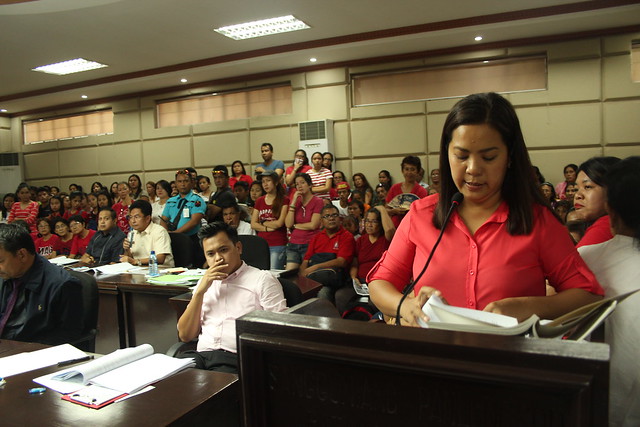
When it was Councilor Kristine Balmes’ time to speak, everyone in the room turned their attention to the podium. She is a longtime campaigner for climate justice and a well known anti-coal campaigner in her home province of Batangas.
At the heart of Balmes’ speech was “malasakit”—a Filipino term that can be roughly translated into English as “capability to care for, be selfless, and sacrifice for others.” It is a cultural value that uniquely defines how a Filipino is considerate and selfless. It is compassion, empathy, accountability, ownership, and putting one's interest behind others, all rolled into one.[v] She said that to reject the applications is to have malasakit not only for the local residents of Batangas, but also malasakit for all Filipinos, malasakit for every human in our planet living in “our common home,” malasakit for all the future generations to come.
The pro-coal councilors argued that the issue should not be made personal. Balmes countered this by saying “Walang makapagsasabi sa mga councilors dito na nakatira sila sa tabi ng coal-fired power plant. Ako mismo ay nakatira katabi ng coal-fired power plant. Hindi mo pwedeng sabihin na ipikit ko na lang ang mga mata ko at huwag suminghot ng kanilang mga ibinubuga. Nagkakasakit at namamatay na ang mga tao — paanong hindi gagawing personal? Araw-araw naming nilalabanan ang coal — paanong hindi gagawing personal?” (No other councilor in this room can say that he or she is living beside or near a coal-fired plant. I, myself, live close to a coal-fired power plant. You cannot say to me that I can just close my eyes and not breathe the smoke the plant emits. The people are getting sick and dying—how do we not make it personal? We fight against coal everyday—how do we not make it personal?)
Weeping was heard from the back; the people were moved by the words of Councilor Balmes, their eyes mirroring their emotions. It is very rare to have a person of authority stand up for the people.
After all was said and done, and all councilors had their chance to cast their votes, the final result was revealed.
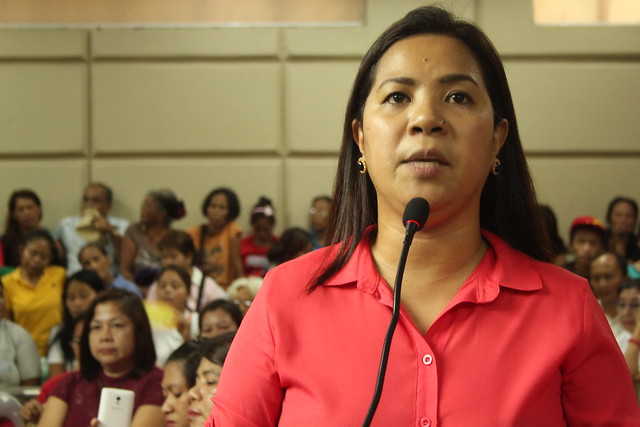
In the two-hour session, in front of civil society groups—Focus on the Global South, Philippine Movement for Climate Justice, Asian Peoples Movement on Debt and Development, Greenpeace Philippines, among others—the coal fired-power plant application was approved.
In the end, it was 6-4 in favor of approving the city resolution granting JG Summit the clearance to erect the plant, to the dismay of the people in red.
Councilors Julian Villena, Alyssa Renee Cruz Atienza, Angelito Dimacuha, Armando Lazarte, Serge Rex Atienza, and Gerardo dela Roca voted yes.
Councilors Kristine Balmes, Hamilton Blanco, Claudette Ambida, and Aileen Montalbo voted no.
One abstained.
Had it been tied at 5-5, the presiding officer, Vice Mayor Emilio Berberabe would have been asked to cast his vote to break the tie. Before the session ended, he manifested that he would have voted no.
The tense session ended; this battle “lost,” but not the fight. Emotional anti-coal campaigners left the room vowing to continue the struggle against coal and other forms of dirty energy.
The local struggle of Batangas against coal clearly shows the need to seriously explore alternatives to coal and push for a more equitable, sustainable, and pro-poor development.
But a critical question has been raised—does government actually have the will to turn its back on coal, given how it is touted as one of the largest sources of tax revenue (excise tax of ₱10.00 per metric ton) and that the Philippines is still heavily reliant on coal in providing electricity for the country? The Department of Energy has said “nearly 70 percent of the committed power to come online until 2019 are coal-fired power plants.”
Does government actually have the will to turn its back on coal and transition to clean and renewable energy for the common good?
“The notion of the common good also extends to future generations. The global economic crises have made painfully obvious the detrimental effects of disregarding our common destiny, which cannot exclude those who come after us. We can no longer speak of sustainable development apart from intergenerational solidarity. Once we start to think about the kind of world we are leaving to future generations, we look at things differently; we realize that the world is a gift which we have freely received and must share with others. Since the world has been given to us, we can no longer view reality in a purely utilitarian way, in which efficiency and productivity are entirely geared to our individual benefit. Intergenerational solidarity is not optional, but rather a basic question of justice, since the world we have received also belongs to those who will follow us,” said Pope Francis, in the Laudato si’ (paragraph 159)
[i] The Break Free from Fossil Fuels Campaign is a globally coordinated effort to escalate the fight against fossil fuels and to accelerate the just transition to 100% renewable energy. For more information, please go to: https://breakfree2016.org/ and https://philippines.breakfree2016.org/
[ii] http://w2.vatican.va/content/francesco/en/encyclicals/documents/papa-francesco_20150524_enciclica-laudato-si.html

